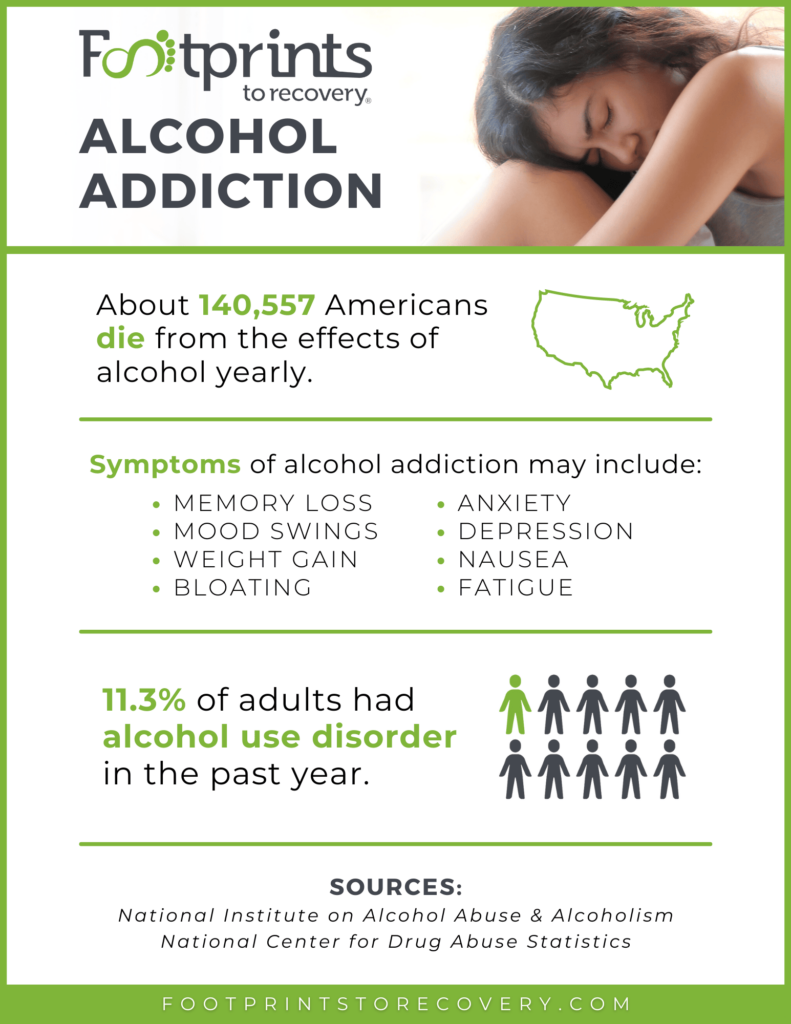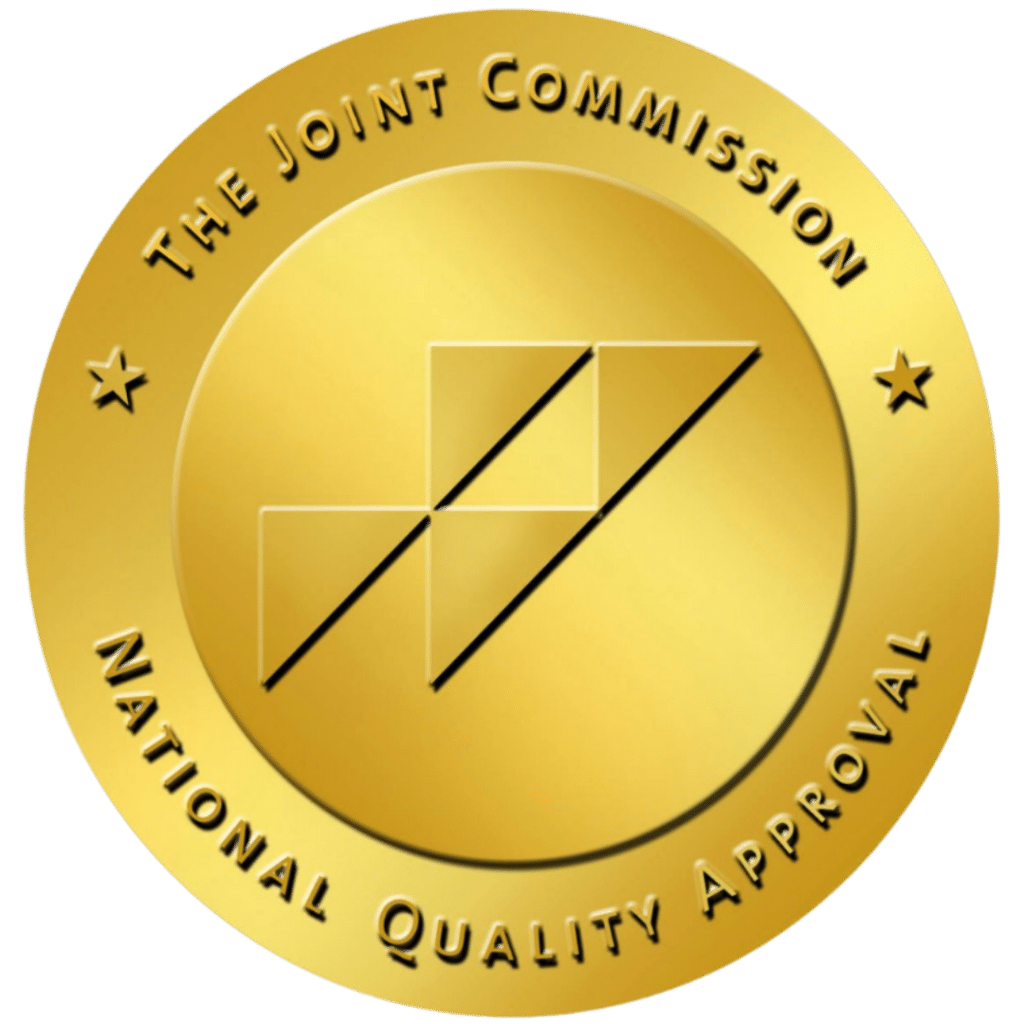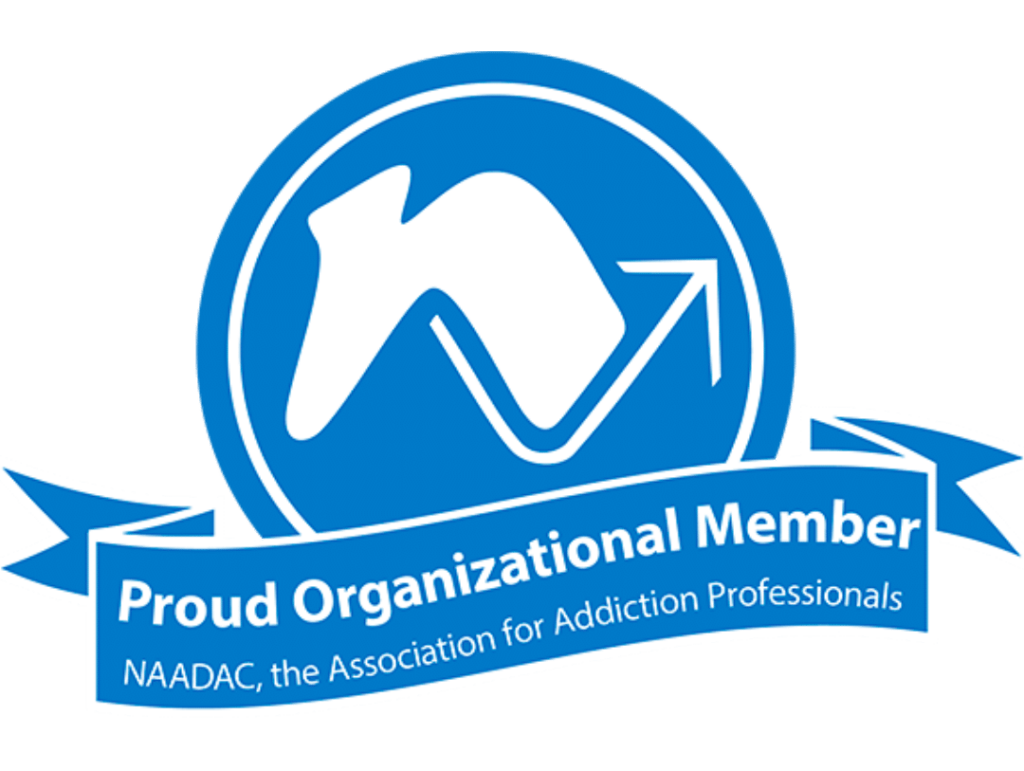Alcohol is the most used addictive substance in the United States. 17.6 million people, or one in every 12 adults, suffer from alcohol abuse or dependence. Due to the social acceptance and widespread availability, alcohol addiction issues can easily be overlooked by those surrounding you. Finding a specialized alcohol rehab program is the best way to address your alcoholism.
At Footprints to Recovery, our goal is to help you end alcohol addiction once and for all. Our treatment approach enables you to develop life skills and healthy habits, giving you a real chance at overcoming your alcohol addiction.
We offer a full continuum of care for alcoholism at our treatment facilities. Working with our licensed treatment centers and staff is always a better option than trying to overcome alcohol use disorder on your own. Our behavioral health professionals can assist with dual diagnosis treatment for addiction and mental health disorders so you can get your quality of life back.

Signs You Need Alcohol Rehab
Everyone’s experience with alcoholism is unique. Some people may not experience the consequences of drinking for a long time. Some people may experience the consequences of their alcohol addiction when they see the signs of the problem of drinking themselves.
One of the hardest parts of rehabilitation is knowing when to seek help. Step back and count the negative effects of your alcohol use to understand it. If drinking is causing problems in your life, you may have an alcohol use disorder.
Here are a few common signs you might need alcohol rehab:
- You drink in the mornings to “cure” hangovers or attempt to avoid withdrawal symptoms
- You’re performing poorly at work or in school due to your drinking
- You drink alcohol for stress relief
- You’ve built a tolerance to alcohol
- You experience intense cravings for alcohol, especially as the day goes on
- You avoid functions or social gatherings where alcohol is not being served
- Your health is starting to suffer
- Your relationships are pushed to the side due to your drinking
- You have legal consequences related to your alcohol consumption (DUI, public intoxication charges, and many more)
Self-Assessment: Am I Addicted?
"*" indicates required fields
The team at Footprints to Recovery can help you identify a drinking problem using the latest diagnostic criteria. Then, we’ll design a unique alcohol recovery treatment plan suited to your needs. Personalized treatment increases the chances of sobriety and long-term health and wellness.

What Is Alcohol Addiction Treatment Like?
Footprints to Recovery is where you can turn your life around and find lasting sobriety. If you’re ready to leave your addiction behind, the team at Footprints to Recovery is here to guide you through each step of the alcohol addiction treatment process.
Here’s what you can expect when you attend alcohol addiction treatment:
Consultation
The first step is to contact Footprints to Recovery to schedule an initial consultation with our admissions team. This consultation will involve speaking with one of our skilled clinicians. Your intake specialist will ask general questions about your life, and they’ll want to know about the following:
- Your demographics and location
- What type of addiction you’re struggling with
- Any other medical or mental health issues
- The best immediate care recommended
- Insurance coverage, payment options
Help with Alcohol Withdrawal and Detox Symptoms
Alcohol withdrawal is risky, causing seizures and delirium tremens. Without medical supervision, these symptoms can escalate quickly. Professional oversight ensures timely intervention and access to medications that alleviate discomfort and prevent complications. With medical support, people can detox safely and get the care they need to enter our alcohol addiction treatment program.
Unique Treatment Plan
Once you’ve met with a therapist for your initial consultation, the next step is to diagnose any co-occurring substance abuse and mental health disorders and create a unique treatment plan based on your individual needs. At Footprints to Recovery, there is no one-size-fits-all approach to treatment. We take the time to learn about our clients to meet their needs in recovery. We will ask some of the following questions during your treatment planning:
- Your history of alcohol and drug use
- Your medical history
- Any other factors leading to the development of an alcohol use disorder
Alcohol Rehab Options
Medical Detox
24/7 medically managed care of withdrawal symptoms will help you detox from drugs or alcohol. Our medical staff will oversee your alcohol detox process and ensure you are comfortable and stable. This level of care is best if you’re in active alcohol addiction or have had a drink within the last 10 days. You shouldn’t attempt to detox from alcohol by yourself due to the severe (and sometimes deadly) withdrawal symptoms. Our medical staff will administer medications to ease the discomfort and risks of detoxing on your own.
Medical detox length depends on the severity of your addiction and other medical issues.
Residential / Inpatient Treatment
After you are free from alcohol withdrawal symptoms, most people enter a residential alcohol rehab program. Residential alcohol rehab is a 24/7 setting, allowing you to live in a safe space and learn new coping skills with your peers. You will attend a variety of therapies, like group therapy and family therapy. During this time away from your day-to-day activities, you can address underlying mental health issues. Your days will be structured to give you the best chance at recovery.
Residential treatment is usually 30-90 days, depending on your needs.
Partial Hospitalization Program
A partial hospitalization program (PHP) is a step down from residential treatment. You will live independently while continuing to work on your recovery from alcohol addiction. PHP meets in a group setting to practice new coping skills and discuss similar challenges in recovery. You will also have individual therapy sessions and other supportive programming.
PHP is 5 days a week, 6 hours a day, from 9 am – 3 pm.
Intensive Outpatient Program
Our intensive outpatient program is a further reduced schedule, giving you the freedom to return to your job and daily life. You will live at home but have the additional support of group settings, individual therapy, and coping skills for your new life in sobriety.
IOP is 3 to 5 days per week, for 3 hours per day, with day and evening schedules.
Outpatient Program
Outpatient alcohol addiction treatment is for someone who needs additional support, like one-on-one therapy sessions and group therapy. This is usually the last phase of addiction treatment. Many people find this extra level of support in their life of sobriety very helpful in staying on track.
OP is 1-3 days a week, depending on your needs.
How Footprints to Recovery Can Help
- Treating underlying mental health disorders making sobriety difficult
- A safe, alcohol-free space to learn new skills required for long-term sobriety
- Help to build a strong social support system
- Set reachable goals
- Coping with or avoiding triggers possibly causing relapse
- Resources to assist with housing, employment, and skill-building

Why Choose Footprints to Recovery for Alcohol Addiction Treatment
Licensed Addiction Treatment Staff
The clinical team at Footprints to Recovery is fully licensed and accredited to provide addiction treatment services. Our addiction treatment team oversees each step of the recovery process so you can focus on recovery.
Safe and Comfortable Facility
The goal of recovery is to help you move past addiction. You need to feel as secure as possible as you change your life. Our facilities offer a safe, home-like setting where you can feel welcome and accepted throughout your recovery.
Therapies
Therapy plays a crucial role in treating alcoholism by addressing the underlying psychological, emotional, and behavioral aspects of addiction. Different therapies are used to help you understand your addiction, develop coping skills, manage triggers, and maintain long-term sobriety. The most common types of therapies used are group therapy, individual therapy, and, if appropriate, family therapy.
If you suffer from co-occurring mental health disorders (also known as dual diagnosis treatment), our integrated treatment approach addresses both addiction and mental health issues.
Aftercare
After completing alcohol rehab, aftercare is a crucial phase of maintaining sobriety and preventing relapse. Aftercare programs provide ongoing support, guidance, and resources to people who have completed formal treatment. You and your therapist will outline strategies and resources for maintaining sobriety once you leave our rehab facility. Staying engaged in aftercare activities and utilizing available resources can significantly increase the likelihood of long-term sobriety and successful, long-term recovery.
Are you ready to take the leap and start your journey to a life free from alcoholism? Contact our admissions team today for insurance verification or to ask our team members questions about alcohol rehab. An inability to pay for treatment shouldn’t deter you from getting help. Our team can verify your insurance or outline the other payment options.
Not all addiction treatment centers are the same. Footprints to Recovery is dedicated to quality care. Call our team today and leave alcohol abuse in the past.
Alcohol Rehab FAQ
Inpatient vs Outpatient Alcohol Addiction Treatment
Inpatient and outpatient alcohol treatment are two different approaches to alcohol addiction, each with its advantages and disadvantages.
Inpatient Alcohol Rehab
Inpatient care provides 24/7 supervision and support, ensuring a controlled and alcohol-free environment during the critical early stages of recovery. It follows a structured routine with therapy sessions, group activities, and treatments. This structure can help you establish new routines and habits. Being away from the outside world and daily stressors allows you to focus on your recovery without distractions fully. Inpatient facilities can provide medical detoxification and immediate medical attention if needed.
Inpatient rehab often requires a more extended time commitment, ranging from a few weeks to several months, depending on the program.
Outpatient Alcohol Rehab
Outpatient care allows you to maintain your daily routines, responsibilities, and connections to family and work while receiving treatment. Outpatient treatment is generally more cost-effective than inpatient rehab because it doesn’t involve accommodations and other residential costs. Outpatient programs offer group therapy and support sessions. These provide a sense of community and accountability. Outpatient treatment is often a step down from inpatient care, providing ongoing support as you transition back to your regular life.
Outpatient rehab typically involves fewer therapy hours and less intensive support than an inpatient program. This might not be insufficient for individuals with severe addictions.
How Long Is Alcohol Addiction Rehab?
Recovery is different for everyone, so there is no set timeline for alcohol addiction treatment. Inpatient or residential rehab programs last between 28 days to several months. Your treatment length will vary based on the level of care, your treatment progress, and your insurance coverage. Some people who need dual diagnosis treatment or have other challenges can increase the length of their treatment.
The addiction recovery timeline can vary depending on factors like:
- How long you’ve abused alcohol
- How much alcohol you consume
- If you’ve tried to reach sobriety before and have not been successful
For most people, sobriety is a lifelong process requiring regular care and maintenance. Our addiction treatment will guide you through the best treatment plan to fit your individual needs.
Costs of Alcohol Rehab and Insurance Coverage
Alcohol rehab costs vary depending on whether it’s inpatient or outpatient. Inpatient treatment tends to be more expensive. The duration of rehab also affects the cost—the longer you stay, the more it may cost. Treatment typically progresses from detox to inpatient, then outpatient, and possibly to outpatient.
Insurance coverage for alcohol treatment varies depending on your carrier. Check with your provider to see what’s covered. Regardless of your insurance coverage, call Footprints to Recovery to speak to one of our intake specialists to learn more about alcohol rehab payment options.
What Is Dual Diagnosis Treatment?
People develop alcohol use disorder (AUD) for various reasons, with mental health problems being a common cause. Mental health issues can worsen substance abuse problems. When facing both mental health issues and alcohol abuse, dual diagnosis treatment is recommended. Dual diagnosis, or co-occurring disorders, is when someone has both an addiction and mental health challenges simultaneously.
Some common mental health disorders dual diagnosis treatment can help with are:
- Depression
- Anxiety
- Bipolar disorders
- Post-traumatic stress disorder (PTSD)
Dual diagnosis is complex because both substance use disorder and mental health problems can make achieving sobriety harder. For instance, alcohol abuse can worsen depression and vice versa. That’s why professional alcohol treatment is key for a future without addiction and stability.
Medications for Alcohol Detox and Withdrawal
Our team will use medications to handle alcohol detox and withdrawal symptoms. These medications, known as MAT drugs (Medication-Assisted Treatment), help manage cravings and symptoms during detox. They can ease anxiety and seizures, and medications like naltrexone or acamprosate reduce alcohol cravings for long-term sobriety. MAT is often paired with counseling and support for complete treatment.
Questions about treatment options?
Our admissions team is available 24/7 to listen to your story and help you get started with the next steps.








